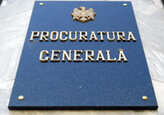
National Anti-Corruption Center (CNA): Courts continue to apply minimum penalties on persons guilty of corruption.
This is stated in the strategic analysis of the practice of applying fines for acts of corruption prepared by the National Anti-Corruption Center. It is noted that the courts applied minimum sanctions against persons convicted of corrupt acts - this also applies to fines and sentences to imprisonment or deprivation of the right to hold certain positions. According to the ministry, of the total number of court sentences passed in cases of corruption and related cases in 2018-2020, 987 criminal cases were analyzed, of which 79% (777 cases) ended in convictions, 9% (90 cases) - the acquittal of a person, and in 12% of cases (120 cases) - the cases were terminated. It is reported that in 566 of 777 convictions (73%), the penalty was a fine. In particular, punishment in the form of imprisonment with a fine was applied in 22% of the analyzed cases, a fine with deprivation of the right to hold certain positions or engage in certain activities - in 18% of the analyzed cases, and in 5% of cases there was a criminal fine with both types of punishments. In 64% of all cases of imposition of fines for corruption or cases related to corruption, the amount of the sanction was below the minimum limit established by the criminal norm, in 26% the minimum fine was applied, in 9% - the average value, and in 1% - the maximum value. In particular, the maximum penalty was applied only in 2 cases. The use of imprisonment and deprivation of the right to engage in certain activities or perform certain functions has also focused on the minimum value provided for by the criminal law. A similar situation is observed in cases of delinquency. Of the 211 analyzed cases of offenses, 51 (24%) persons were found guilty and 158 cases (75%) were terminated. Thus, out of 51 cases of imposition of a fine for an offense on the basis of corruption, in 26 cases (51%) the minimum amount provided for by the norm of the offense was applied; in 10 cases (20%) a value between the minimum and average threshold was applied; a fine above average was charged in 12 cases (24%). The maximum amount of the fine was applied only in 2 cases of abuse of power or official authority. Also, the minimum punishments provided for by legislation were applied in the form of deprivation of the right to engage in certain activities or certain functions: in 29 cases (57% of the total) - this punishment was applied for 3 months, in 4 cases - for 4 months, in 9 cases - for 6 months, in 2 cases - 10 months, and in 6 cases the maximum period was applied - 12 months. // 06.08.2021 – InfoMarket





